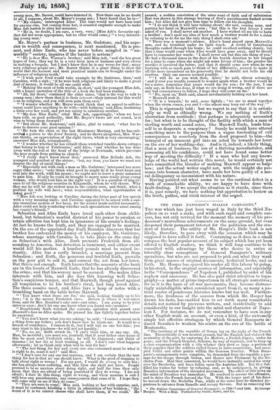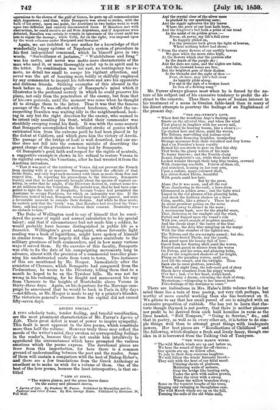THE FIRST NAPOLEON'S ITAIIIN CAMPAIGNS. * THE war which has just
been waged in Italy by the third Na- poleon on so vast a scale, and with such rapid and complete suc- cess, has not only revived for the moment the memory of his pre- decessor's marvellous achievements on the same ground, but even deepened their permanent interest for the politician and the stu- dent of history. The utility of Mr. Hooper's little book is not likely, therefore, to pass away with the occasion which may be supposed to have called it forth. Containing as it does in a small compass the best popular account of its subject which has yet been offered to English readers, we think it will long continue to be consulted with advantage by those who desire to arrive at tolerably clear conceptions of General Bonaparte's military operations, but who are not prepared to pick out what they want from great masses of original documents, technical books, and so forth. Mr. Hooper has spared his reader all this labour by going, in his stead, to the original sources of information, and especially to the " Correspondence " of Napoleon I, published by order of his nephew and successor. He has also paid strict attention to topo- graphy—a matter of prime importance in all strategic narratives ; for as it is the basis of all war movements, they become distress- ingly unintelligible when considered apart from it, as many a pa- tient reader of ponderous histories knows but too well. Further- more, the freshness of the sources from which Mr. Hooper has drawn his facts, has enabled him to set forth many remarkable details not noticed by previous writers, and incidentally to add considerably to our insight into the mind and character of Napo- leon I. For instance, we do not remember to have seen in any other English work an account, or even a hint, of the extremely simple but effective stratagem by which General Bonaparte in- duced Beaulieu to weaken his centre on the eve of the battle of Montenotte.
"The territory of the republic of Genoa lay on the right of the French line. Theoretically it was neutral ground, but the English had violated the neutrality of the port, by capturing La Modeste, a French frigate, under its guns ; and the French General, Scherer, by way of reprisals, and to keep up a close communication with a city whence they drew so large a portion of their supplies that the soldiers styled Genoa la mere nourricier_ ,e had occu- pied Voltri and other points within the Genoese frontier. When Bona- parte's arrangements were complete, he demanded from the republic a pas- sage for his troops through Genoa, and thence into Piedmont by the Bo- chetta Pass. Had they consented, he would have instantly carried his army over the Broehetta, and have fallen upon the Austrian left. But they ful- filled his wishes far better by refusing, and, as he anticipated, by giving Beaulieu information of the intended movement. The effect of tins news on the mind of Beaulieu was immediate. He resolved to assume the offensive, and to drive the French beyond the Var. With the larger part of his force he moved down the Bochetta Pass, while at the same time he directed Ar- genteau to advance from Smell° and occupy Savona. But in removing his
• 7%e Italian Campaigns of General Bonaparte, in 1796-'7 and 1800. By George Hooper. With a Map. Published by Smith, Elder, and Co.
operations to the shores of the gulf of Genoa, he gave up all communication with Argentean ; and thus, while Bonaparte was about to strike, with the bulk of his army, upon one point, the Austrians in two bodies went to work upon two different and entirely disconnected lines. If Beaulieu met with obstruction, he could receive no aid from Argenteau, and if Argenteau were defeated, Beaulieu was certain to remain in ignorance of the event until too ;ate to repair the damage ; while Colli, far on the right, was imposed upon by the weak columns under Macquard and Serurier.'
Again, we are indebted to our author for a knowledge of that wonderfully happy epitome of Napoleon's system of procedure in his first independent command, which he himself gave in two words. " Surveillance et jactanee," " Watchfulness and Brag " was his motto, and never was motto more characteristic of the man who used it, or more thoroughly acted up to in spirit and to the letter. No combination was too vast, no contingency too re- mote, no detail too small to escape his vigilant attention, and never was the art of boasting more boldly or skilfully employed by any commander to inspirit his followers and awe his opponents and dubious friends. Striking examples of this abound in the book before us. Another quality of Bonaparte's mind which it illustrates is the profound secrecy in which he could preserve his plans, not only frem the penetration of the enemy, but from that of his own generals, until themoment was come when he thought . fit to divulge them to the latter. Thus it was that the famous passage of the Po was effected without hindrance, whilst the un- suspecting Beaulieu was waiting idly in the neighbourhood, look- ing in any but the right direction for the enemy, who seemed to be intent only assailing his front, whilst their commander was stealthily creeping round his flank. It was with the same secrecy that Bonaparte accomplished the brilliant stroke of genius which extricated him from the extreme peril he had been placed in by the defeat at Caldiero, and which gave him the victory of Arcola. The passage of the bridge of Lodi is well described, and our au- thor does not fall into the common mistake of describing the grand charge of the grenadiers as being led by Bonaparte.
Of Bonaparte's good faith and respect for the rights of neutrals, a suggestive example is shown in his refusal to restore Verona to its rightful owners, the Venetians, after he had wrested it from the Austrian intruders.
"That it was part of the territory of Venice did not prevent the French from dealing with it as masters. Bonaparte bullied the officials of that feeble State, and only kept such measures with them as made them fear and respect him. In reporting his proceedings to the Directory, Bonaparte frankly said that he had expressly brought about the species of rupture ex- isting, in order that he might, if the Directory desired it, extract some five ar six millions from the Venetians. His pretext was that he bad been com- pelled to fight the battle of Borghetto, because Venice had permitted the Austrians to occupy Peschiera, for which an indemnity was due. If the Directory looked beyond, Bonaparte would keep open the quarrel, and seize a favourable moment to execute their designs. And while he thus wrote, he naively said that the ' truth' was, that Beaulieu had deceived the Vene- tians, and had occupied Peschiera without their consent. Neutrality was no obstacle to him."
The Duke of Wellington used to say of himself that he consi- dered the power of rapid and correct calculation to be his special talent ; and that if circumstances had not made him a soldier, he would probably have become distinguished in public life as a financier. Wellington's great antagonist, whose favourite light reading was a book of logarithms, might have spoken of himself in similar terms. How largely did this power contribute to the military greatness of both commanders, and in how many various ways it served them. By the exercise of this faculty, Bonaparte was able to fix the date of his campaigning movements long in advance, almost with the precision of a commercial traveller plan- Ding his unobstructed route from town to town. Two instances of this are mentioned by Mr. Hooper. Immediately after the armistice of Cherasco, which Bonaparte had conquered from the Piedmontese, he wrote to the Directory, telling them that in a month he hoped to be on the Tyrolese hills. He was not far wrong in his reckoning, for he fought and manoeuvred his way from Cheraw° to the heights of Montebaldo above Verona in thirty-three days. Again, on his departure for the Marengo cam- paign he announced that he would be back in Paris in fifty days —not fifteen, as Mr. Hooper is made to say by a printer's blunder. The victorious general's absence from his capital did not exceed fifty-seven days.



























 Previous page
Previous page